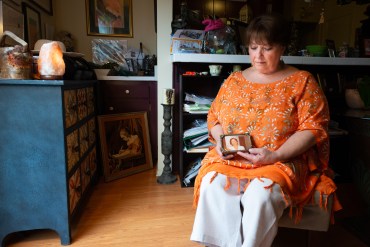First Female Dean ‘A Sea Of Change’ At USC’s Scandal-Plagued Medical School
Laura Mosqueda, a geriatrician, wants to train new doctors to better care for elderly people as the country’s population ages. She will face a big challenge as USC reels from drug and sexual misconduct scandals that have enraged students and landed the university in legal hot water.
Resucitar o no resucitar: cómo evitar errores con los testamentos en vida
Expertos aseguran que los malentendidos que provocan documentos destinados a guiar la toma de decisiones al final de la vida son “sorprendentemente comunes”.
That ‘Living Will’ You Signed? At The ER, It Could Be Open To Interpretation.
End-of-life documents express your preferences for care but may not be binding medical orders. Here’s how to better prepare for the unexpected — that your last wishes won’t be carried out.
Medicare Takes Aim At Boomerang Hospitalizations Of Nursing Home Patients
One in 5 Medicare patients who leave the hospital for a nursing home end up back in the hospital. To discourage this, the Centers for Medicare & Medicaid Services will soon give bonuses and penalties to facilities based on their rehospitalization rates.
Suspension Of California’s Aid-In-Dying Law Leaves Sick Patients In Limbo
Doctors have stopped writing lethal prescriptions and pharmacists have stopped filling them after a court fight over how the law was enacted.
‘They Deserve It’: In Foster Homes, Veterans Are Cared For Like Family
With the motto “Where Heroes Meet Angels,” a small Veterans Affairs effort pairs vets in need of nursing home care with caregivers willing to share their homes. Medical foster homes save money, but it’s difficult to find enough spaces for all those who could benefit.
Dodging Dementia: More Of Us Get At Least A Dozen Good, Happy Years After 65
With longer lives and lower rates of dementia, most seniors are enjoying more years of life with good cognition — a welcome trend.
La mayoría de los adultos mayores tienen una larga “esperanza de vida cognitiva”
Nuevos estudios revelan que las funciones cognitivas perduran saludables más de una década después de cumplir los 65, esquivando a la demencia.
¿Seguiremos siendo relevantes cuando tengamos 64 años?
El nido vacío, el retiro, son factores de cambio que hacen que muchas personas ya no se sientan relevantes. Qué hacer para vivir los 60 a pleno.
Will We Still Be Relevant ‘When We’re 64’?
Older adults often feel invisible as their interactions with younger people dwindle and hardly anyone seems to seek their advice. To make matters worse, studies link loneliness to weaker immune systems and poorer physical health.
Nueva tendencia: las parejas de adultos mayores que viven separadas
Cada vez más adultos mayores deciden estar en relaciones sentimentales sin vivir con su pareja. Dicen que el compromiso es el mismo, pero que valoran su tiempo solos.
Living Apart Together: A New Option for Older Adults
Why older couples in supportive, loving, long-term relationships decide to live apart and not get married.
En Puerto Rico, sobrevivientes del huracán María enfrentan la soledad y la depresión
La tasa de suicidos aumentó dramáticamente en la isla desde que el huracán María impactó en septiembre pasado.
Listless And Lonely In Puerto Rico, Some Older Storm Survivors Consider Suicide
More than six months ago, Hurricane Maria upended routines and shuttered services on the island leading to a sense of despair and isolation, especially among older people.
Voces oficiales aseguran que esta supervisión deficiente hizo que el número de incidentes que podrían causar lesiones graves o la muerte haya aumentado significativamente en los últimos años.
Ayudan con arte a que los cuidadores familiares tengan un merecido recreo
Hay cerca de 42 millones de personas que cuidan a un familiar, adulto o niño, enfermo como un trabajo de tiempo completo. Programas de arte les ofrecen un respiro.
Family Caregivers Are Getting A Break — And Extra Coaching
Across the country, community groups, hospitals and government agencies are stepping in to support the estimated 42 million family caregivers.
New Medicare Perk For Diabetes Prevention Stumbles At Rollout
On April 1, Medicare launched a major initiative — a diabetes prevention program for seniors and people with serious disabilities— that is available in only a few cities.
Decisión de Barbara Bush al final de su vida crea debate sobre los “cuidados paliativos”
Muchos creen que elegir los “cuidados paliativos” significa abandonar el tratamiento. Expertos aclaran por qué esta creencia es errónea.
Más mujeres que hombres sufren ahora una “aterradora” enfermedad pulmonar
La enfermedad pulmonar obstructiva crónica (EPOC) está afectando a millones de mujeres que comenzaron a fumar en los años 60 y 70, casi como una forma de rebelión.





















